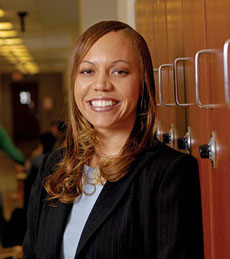
Shadonna Hawkins, a master’s student in the Johns Hopkins University School of Nursing Forensic Nursing Specialist Program, recently became the first nurse to complete an internship with the U. S. Navy’s Naval Criminal Investigative Service (NCIS). In an interview conducted with Johns Hopkins Nursing writer Jim Miller during her internship, she describes her experience.
Q. What is the Navy Criminal Investigative Service, and what is its charge?
A. It’s an elite, worldwide federal law enforcement organization staffed by civilian special agents, intelligence specialists, and other professionals. Its primary mission is to protect and serve the United States Navy and Marine Corps by providing law enforcement, counterintelligence, and security functions and by taking measures to prevent, protect, and reduce the major criminal, intelligence, and terrorist threats that confront naval forces.
Q. What is your role at NCIS?
A. I’m assigned to the Death Investigations Unit. I perform case analyses, develop case analysis reports for the Death Review Board, and view photographic evidence. My knowledge of forensic wound identification and documentation enables me to identify the accuracy of the information presented in the cases. Also, my education helps me to interpret medical records and decipher autopsy reports. At NCIS I’ve been able to incorporate my forensic education, past clinical experiences, and basic nursing knowledge.
Q. What has been your most unusual experience while at NCIS?
A. Probably going to the firing range. We went on a field trip and were side-by-side with agents firing several weapons. Initially, handling a gun was a scary experience but with some help I quickly got over my fears. We not only fired several guns, but even loaded them. Who would have thought it….a nurse firing a semi-automatic weapon!
That experience proved very helpful. When you actually fire and view the weapons that cause a wound, it can potentially make your assessment of the wound more accurate. It also advanced my understanding of ballistics, an often complex forensic topic and made it “real life” for me.
Q. Is there any aspect of your nursing education that has been especially helpful?
A. Team play has been invaluable. NCIS collaborates with numerous agencies during investigations and team play is imperative. Because I’m accustomed to working in a team environment, I’ve been able to meet the organizations’ expectation of team cooperation and integrate it in my daily activities.
Teamwork is also one of the major differences between “real life” and television portrayals of CSI work. At a crime scene everyone has a function and one person does not function in all these capacities as often portrayed on TV.
Q. What sparked your interest in forensic nursing?
A. As an undergraduate I visited the Medical Examiner’s Office and it was like no other clinical I had experienced. From entering the autopsy room to the end of the autopsy observation, my heart raced with excitement and intrigue. It was unique. That led me to the newly formed Clinical Nurse Specialist degree with a forensic focus program offered by the Johns Hopkins University School of Nursing.
Q. Do you intend to pursue a nursing career in the law enforcement field?
A. The job market appears very promising. Through my NCIS internship, my interest in federal law enforcement has grown and I believe the field will be a good fit for me, one where I can utilize the analytical skills obtained through my basic nursing and forensic education and past clinical experiences. Now my goal is to be one of the first forensic nurses—to show federal law enforcement how our skills can benefit law enforcement organizations.